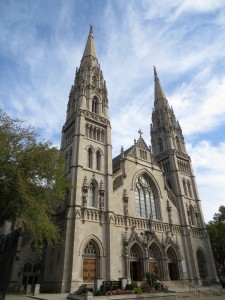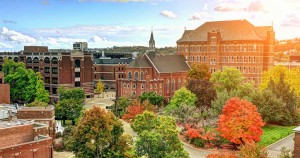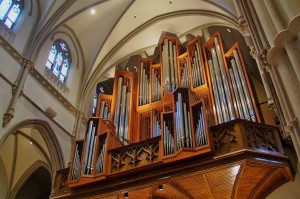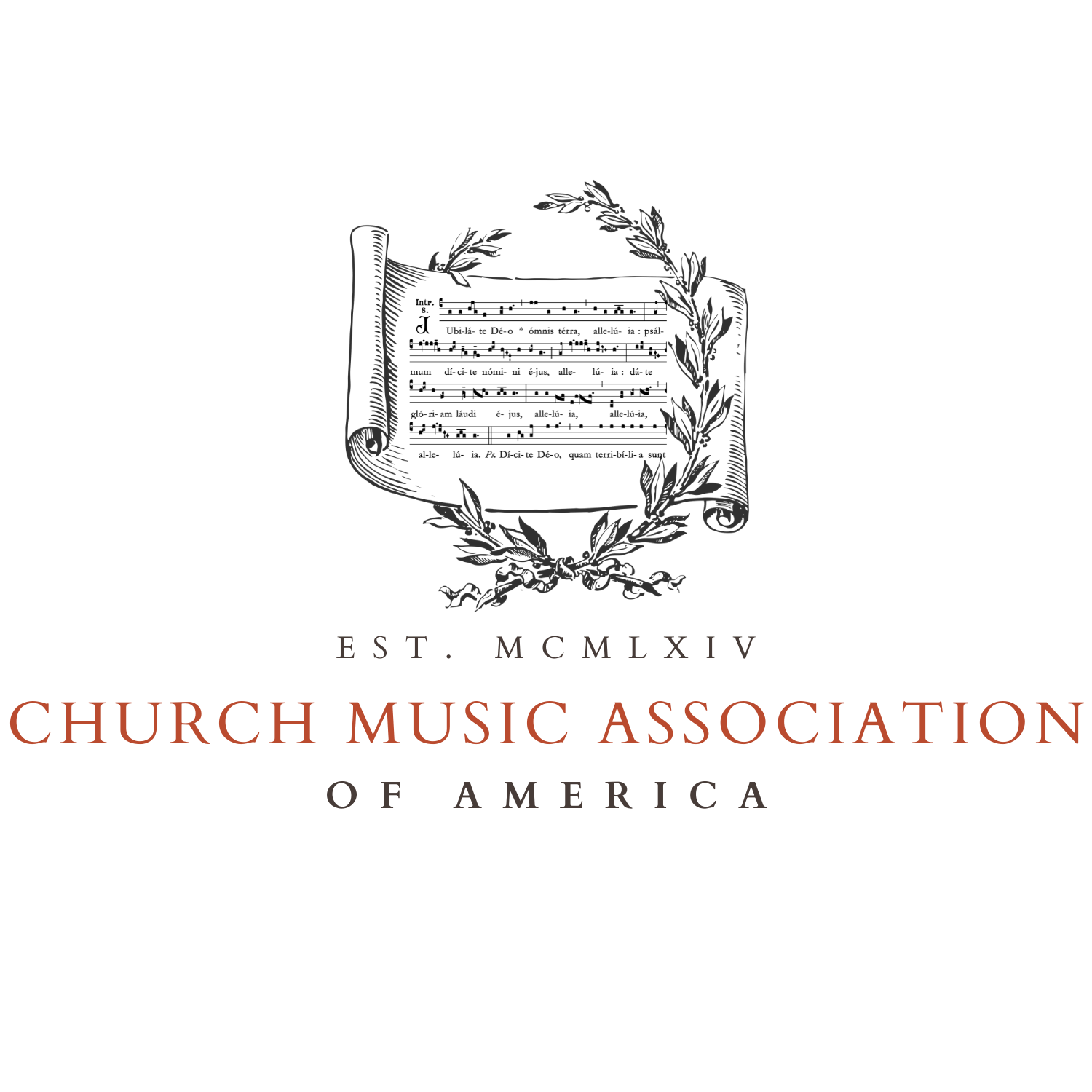New: Download the 2015 book now
Colloquium Highlights
- Extensive training in Gregorian chant under a world-class faculty, with choices of a chant class for beginners, a course on chant improvisation, a Divine Office course, refresher courses for men or women and schola chant courses for advanced men or women.
- Breakout sessions during the week on a variety of topics, from directing, organist master classes, chironomy, semiology, children’s programs, among others.
- Plenary lectures on topics of interest to all who love sacred music.
- Optional choral experience with one of four choirs singing sacred music of the masters such as Josquin, Mouton, Tallis, Palestrina, Byrd, Campra, Fauré, Mawby and others. You’ll learn with our gifted faculty, with choices of a beginning polyphony choir for those new to polyphony, or three choirs for more experienced singers.
- Daily liturgies with careful attention to musical settings in English and Latin.
- A gala welcome reception and dinner at the beautiful Duquesne University Power Center.
- Optional on-campus meals with your fellow participants for breakfasts and lunches and some dinner meals.
- Optional Dinner and Follies… prepare your light-hearted entertainment to share with your fellow musicians.
- Individual training in vocal production and technique.
- Individual training in organ technique.
- Training for Priests, Deacons, Seminarians in the sung Mass (not restricted to clergy and seminarians).
- All music, including prepared books of chant and polyphony, as part of registration.
- Your own copy of The Parish Book of Chant, 2nd edition.
- Book sales from the CMAA warehouse. We offer discounts on our books to all attendees and an extra 10% discount to CMAA members.
Two Venues
Tuesday, Wednesday and Saturday Colloquium Masses will be held at the Duquesne University chapel; Thursday and Friday Masses will be held at the Cathedral of St. Paul in downtown Pittsburgh. On June 29th, a special organ recital will be performed by Dr. Ann Labounsky on the newly-installed pipe organ at the Duquesne chapel. Thursday evening, we’ll sing an Extraordinary form Vespers service for the Visitation of the Blessed Virgin Mary at St. Paul Cathedral. On Friday, July 3rd, we’ll be treated to another recital by Jonathan Ryan at the Cathedral of St. Paul.
Plenary Speakers
We are delighted to welcome outstanding speakers during the week this year.
Dr. William Mahrt, CMAA President
Why Sing?
The relation of singing to the sacred. How singing is quintessential to the liturgy and what it contributes to the liturgy. The spiritual and psychological benefits of singing.
Rev. Richard Cipolla, PhD, DPhil (Oxon), St. Mary’s Norwalk, CT
Liturgical Music: The Medium and the Message
Liturgical music is not meant to accompany the Liturgy but is an integral and necessary part of the liturgical action and event. It is intimately involved in an incarnational way with both medium and message who is Jesus Christ crucified and risen.
Rev. Jonathan Robinson, Toronto Oratory, Toronto, Canada
Why Plato Banished the Artists, and the Importance of Church Music
More information to be forthcoming…
Biographical information about the Colloquium Faculty
Faculty
Scott Atwood, Christ Our King Catholic Church, Mt. Pleasant, South Carolina
Suzanne Fleming-Atwood, Christ Our King Stella Maris Catholic School, Mt. Pleasant, South Carolina
Wilko Brouwers, Monteverdi Choir, The Netherlands
Dr. Horst Buchholz, CMAA Vice President, St. Louis Cathedral
Mary Ann Carr-Wilson, St. Anne Catholic Church, San Diego, California
Charles Cole, Westminster Cathedral; Brompton Oratory, United Kingdom
Dr. Jennifer Donelson, St. Joseph’s Seminary (Dunwoodie), New York; Managing Editor, Sacred Music
David Hughes, St. Mary, Norwalk, CT
Dr. Ann Labounsky, Duquesne University
Dr. William Mahrt, CMAA President, Stanford University
Matthew Meloche, SS Simon and Jude Cathedral, Phoenix, AZ
Jeffrey Morse, Star of the Sea Church and San Francisco Oratory, San Francisco, CA
Dr. MeeAe Nam, Eastern Michigan University
Michael Olbash, St. Adelaide’s Parish, Peabody, MA
Rev. Robert Pasley, Mater Ecclesiae Catholic Church, Berlin, NJ
John Robinson, St. Paul’s Church, Harvard Square, Cambridge, MA
Jonathan Ryan, Concert Organist
Dr. Edward Schaefer, University of Florida
Scott Turkington, Holy Family Church and Holy Family Academy, Minneapolis, MN
Dr. Paul Weber, St. Martin of Tours Catholic Church, Louisville, KY
Biographical information about the Colloquium Faculty
Sound Files from Previous Colloquia
Curious about the Sacred Music from previous Colloquia? Listen to some of the sound files from previous years at this website: http://music.dierschow.com/Colloquium/
Organ Recitals
We are privileged to have two organ recitals planned for the 2015 Colloquium. On opening night of the Colloquium, Dr. Ann Labounsky will perform an organ recital (program information forthcoming) on the new mechanical action pipe organ at Duquesne University’s chapel, showcasing the lovely instrument that will be installed in 2015. On Friday, July 3rd, 8:30 pm at Pittsburgh’s St. Paul Cathedral, Jonathan Ryan will present a recital (program information forthcoming). Read more about the organ at St. Paul Cathedral here.
Liturgies
| Tuesday, June 30th | Mass, Duquesne Chapel | Ferial of the 13th Sunday of Ordinary Time, Ordinary Form (OF), English |
| Wednesday, July 1st | Mass, Duquesne Chapel | Precious Blood, Extraordinary Form Missa Cantata, (EF), Latin |
| Thursday, July 2nd | Mass, Cathedral of St. Paul | Votive of the Holy Eucharist, OF, Latin |
| Thursday, July 2nd | Vespers, Cathedral of St. Paul | Visitation of the Blessed Virgin Mary, EF, Latin |
| Friday, July 3rd | Mass, Cathedral of St. Paul | Solemn Requiem, EF, Latin |
| Saturday, July 4th | Mass, Duquesne Chapel | Votive of the Blessed Virgin Mary, OF, Latin |
Breakout Sessions
Breakout sessions will be offered Tuesday – Friday on a range of various topics including:
Children’s Programs Series (6)
Organ Master Classes (2) / Conducting Series (2)
Chironomy Series (2)
Miscellaneous Topics (2)
Clergy Training Series (4)
New Music Series (3)
Semiology Series (4)
Spanish Resources (1)
Parish Music Programs (1)
Gregorian Chant Modes (2)
Newcomer Basics (1)
NEW! Complete listing of Breakout Sessions, including descriptions
Chant Course Descriptions
Fundamentals for Men and Women (Director, Scott Turkington): This course in Gregorian chant is intended for real chant beginners: both those who can read modern notation and those with no musical training. Participants will learn how to read the four line staff, the names of the neumes, and how to navigate the intervals with solfege. Rhythm will be introduced. Course material will include the Ordinaries of the Mass and two Propers.
Refresher (two sections: Jonathan Ryan, Men; Wilko Brouwers, Women): This course offers continued study in Gregorian chant and is intended for those who have had some background in chant but do not sing chant on a regular basis. This is a beginning to intermediate course whose primary aim, like the foundations course, will not be performance in liturgy. Participants will be responsible for singing the Ordinaries of the Mass and will be prepared to sing four chant Propers during the week.
Schola (two sections: Charles Cole, Men; Jeffrey Morse, Women): This course is intended for advanced singers who sing chant regularly. The two scholas (men, women) will be responsible for the bulk of the more difficult Mass Propers sung during the week.
Office Choir for Men and Women (Director, David Hughes): This course is intended for intermediate to advanced singers and will concentrate on the singing of the divine office, particularly Vespers psalmody on Thursday evening. This choir will also take the lead in morning and night prayer during the week.
Advanced Seminar on Vocal/Polyphonic Improvisation on Chant (Director, William Mahrt): This course is intended for advanced singers (both men and women) who wish to continue their studies of Gregorian chant. This class will focus on study rather than performance, including various types of improvisation on chant including organum, diaphonum, descant and Fauxbourdon, with the seminar preparing one Mass Proper and one hymn during the week.
Polyphonic Choir Descriptions
Charles Cole: Beginner Motets
This choir is designed to introduce and improve on the critical vocal and musical techniques necessary for singing polyphonic music. Singers will learn how to carry a part on their own, independent of other sections, and without accompaniment. Members of this choir will learn rhythm, pitch, and vocal production. The choir is designed for novice singers who would not yet benefit from a more advanced choir, but it might also be useful for directors who wish to see how a master goes about teaching inexperienced singers to make beautiful music. Two pieces are a part of this choir’s agenda: Ave verum by Gounod, and Ave Maria by Mouton. This choir will sing at Mass on Friday and at Mass on Saturday.
John Robinson: Palestrina Choir
The major piece this choir will sing under Robinson’s direction is the Missa Lauda Sion by Palestrina, which will be sung at Mass on July 2nd. Giovanni Pierluigi da Palestrina (3 February 1525 or 2 February 1526 – 2 February 1594) was an Italian Renaissance composer of sacred music and the best-known 16th-century representati v e of the Roman School of musical composition. He has had a lasting influence on the development of church music, and his work has often been seen as the culmination of Renaissance polyphony. One of the hallmarks of Palestrina’s music is that dissonances are typically relegated to the “weak” beats in a measure. This produced a smoother and more consonant type of polyphony which is now considered to be definitive of late Renaissance music, given Palestrina’s position as Europe’s leading composer (along with Lassus) in the wake of Josquin (d. 1521). The “Palestrina style” now serves as a basis for college Renaissance counterpoint classes, thanks in large part to the efforts of the 18th-century composer and theorist Johann Joseph Fux, who, in a book called Gradus ad Parnassum (Steps to Parnassus, 1725), set about codifying Palestrina’s techniques as a pedagogical tool for students of composition. This choir will also sing motets by modern composer Peter Kwasniewski (O Passio Magna II) at the Mass on Thursday, July 2nd and Josquin’s Offertory motet (Gaude virgo, Mater Christi) for the Mass on Saturday, July 4th.
Horst Buchholz: Fauré Choir
The Fauré Requiem Mass will be the major piece sung under Buchholz’ direction. This Mass includes not only the ordinaries of the Mass, but also the propers and will be an extraordinary form Mass on Friday, July 3rd in honor of the deceased members of the CMAA. Gabriel Fauré (12 May 1845 – 4 November 1924) was a French composer, organist, pianist and teacher. He was one of the foremost French composers of his generation, and his musical style influenced many 20th-century composers. Among his best-known works is his Requiem. Fauré’s music has been described as linking the end of Romanticism with the modernism of the second quarter of the 20th century. In addition, this choir will also sing a Communion motet on June 30th, Lord, make me to know thy ways (Byrd) and another Byrd piece on Thursday, July 2nd, the Offertory motet: O quam suavis.
Wilko Brouwers: Campra Choir
Brouwers’ choir will sing the Missa ad Majorem Dei Gloria by André Campra at the closing Mass on Saturday, July 4th. French composer André Campra (1660-1744) was a dominant figure in French theater and in sacred music. Named to the position of music master at Notre Dame Cathedral in 1694, he introduced the genre of the opéra-ballet with his Les Indes galantes (1697). In 1700, Campra resigned from Notre Dame to pursue his interest in theater full time and produced Tancrède (1702), his greatest tragédie lyrique. Despite a special salary paid to Campra by Louis XV to keep him composing operas, Campra’s later efforts were failures, and he returned to sacred composition; Campra’s sacred motets are regarded as among his finest achievements. In addition, this choir will sing a Tallis motet at the Offertory on Tuesday, June 30th, O Lord Send Thy Holy Spirit, as well as a Communion motet on Thursday, July 2nd by Mawby, Ave verum.
Repertory
View the entire list of musical repertory that will be sung by chant and polyphony choirs for Colloquium XXV:
Repertory by Choir.
NEW! Please note that, wherever available, links to polyphonic music have been provided in the Repertory by Choir document. This includes the Palestrina Mass, the Fauré Mass and all the motets that are not under copyright.
NEW! Music Files Available for Preview
New Music
By popular demand, the Colloquium New Music reading session is back. The New Music Reading for this year’s Sacred Music Colloquium is scheduled for Thursday, July 2, 2015 at 4:30 pm at Synod Hall at St. Paul Cathedral in Pittsburgh. If you have a piece of music you would like to submit for inclusion in the 2015 New Music volume, please sent it to programs@musicasacra.com in PDF format by June 15, 2015. Each composer may submit up to two pieces, for a total limit of 15 pages. A piece can be a motet or Mass movement, Latin- or English-texted, or other choral music suitable for the Roman rite.
In your e-mail, be sure to include your contact information for inclusion in the book. As this is a composers’ forum as much as a reading session, participation is limited to registered Colloquium participants. There is a $30 submission fee, paid through paypal or by check to our office (Address: CMAA, PO Box 4344, Roswell, NM 88202). The fee covers the cost of printing the volume, and saves you from having to make 200 copies of each of your submitted compositions.
In addition to the New Music Reading session, this year’s breakout schedule includes three days of breakouts with David Hughes, where you’ll be able to collaborate with other composers to fine-tune your compositions. Please bring at least 15 copies of the work you plan to use during the session for participants in the breakout.
If you have questions, please contact us at programs@musicasacra.com.
Schedule at a Glance
To see a schedule overview, take a look at our preliminary Schedule at a Glance form.
Schedule
To see the detail of this year’s schedule, take a look at our preliminary Schedule of Events form. This will give detailed information about the events during the week, including times and locations.
Scholarships
The CMAA is dependent on donations for scholarships. If you are interested in sponsoring a musician, priest or seminarian’s attendance, please write to us at programs@musicasacra.com or make a donation to our Annual Fund. No amount is too small. All scholarship donations are applied directly to scholarships. If making a donation to the Annual Fund, you can also specify that your donation is to be used for scholarships. To make a donation to the Annual Fund, please use this form or make an online donation:
To apply for a CMAA Colloquium scholarship, please fill out the application form and scholarship recommendation form and submit them to us prior to April 15, 2015. All applications and recommendations must be received at our office by April 15, 2015. Send applications to us at: CMAA, PO Box 4344, Roswell, NM 88202. In order to process your application, we must have both forms received by the deadline. UPDATE: No more applications being accepted.
Colloquium XXV Registration Details
Registration is Now Closed
Check or credit card payment must accompany registration. Registration must be postmarked on or before March 1st (Early Bird) or May 15th (Regular). Registrations postmarked after May 15th will be charged a $50 late fee. You may register online or by mail. If you wish to make installment payments for your fees, please use the mail-in form. Your registration is not considered complete unless accompanied by the $75 non-refundable deposit. Registrations must be received at the CMAA Office (by mail or online) by the close of business, June 15th. After June 15th, registration is only available by telephone by calling our office at (505) 263-6298 on a space available basis. Registration is now closed.
Cancellation: Requests received in writing at the CMAA Office postmarked on or before June 15th will receive a refund less the non-refundable $75 deposit. After that date, refunds are given only in the form of a credit toward registration for the 2016 Colloquium. Refunds will be processed after the Colloquium. All requests for credit must be received in the CMAA office or by email (programs@musicasacra.com) by June 29th in order to be considered for credit. Late requests may only receive a partial credit, depending on charges to the CMAA for meals or dorm rooms.
Member Discounts
With a current CMAA membership, the members’ rate is available to you; it is not transferable to another person. If your parish has a CMAA parish membership, please note the name of your parish on your registration form.
Not yet a member? Join now and receive the benefits of membership for a full year for the same price as a non-member registration. Once your membership payment is received, you’ll receive an email with information about the member discount code. Email us at gm@musicasacra.com for any questions.
Youth Participants
A parent or chaperone must accompany youth attendees under eighteen. The chaperone must be at least twenty-one years old and registered for the full Colloquium or as a Companion. A parental or guardian permission form and release must be on file with the CMAA before anyone under the age of eighteen may be admitted to the Colloquium. If the youth participant is not accompanied by a parent, a medical treatment authorization form must also be provided for the chaperone or guardian.
Daily Registration
Be sure to indicate the day(s) for which you are registering and note that the fee for full convention registration is usually less than the fee for multiple days.
Additional Information
Companion (Adult): Those registering as companions are welcome to accompany a full Colloquium registrant to all activities except breakouts and choir rehearsals. A separate registration form must be filled out for each companion including payment for any additional activities and must include the name of the Full Convention Registrant.
Arrangements for guests to attend meals may be made, but require at least 72 hours’ notice. The opening banquet is included for all registrants with full tuition or companion pass. If purchasing a meal plan for a guest, add $50 for the opening banquet.
Scholarship Assistance may be available for partial tuition for persons or parishes of limited means. To apply for a scholarship, please see information about scholarship applications above. Or request a packet from the CMAA office by calling (505) 263-6298. Application deadline is April 15.
Photographs and Recordings: You are welcome to take photos and videos, but please do not use flash, especially during sacred liturgies.
We welcome private recordings during the Colloquium. In fact, amateur recordings are kept in a collection online by one of our members at this site, and are available for free access. If you do record a session or liturgy, please consider sharing your files with him so that others may hear them.
Contact us at programs@musicasacra.com for more information about sharing your recordings.
Dormitory Information and Parking
Duquesne University’s Vickroy Hall (address: 1345 Vickroy Street, Pittsburgh, PA 15219) will be used for housing all CMAA participants who register to stay on-campus this year. The entrance desk is secured with round the clock desk staff and equipped with ID card access, so late arrivals are no problem.
The dormitory offers free wifi (login information to be provided later).
The rooms are arranged in suite arrangements, with two rooms sharing a bath between. Rooms are single or double occupancy. Linens will be provided, including sheets, one pillowcase, two bath towels, two washcloths, one pillow and one blanket. If you like to read before bedtime, bring a small book light for your convenience. If you have special medical or dietary needs and require a refrigerator in the room, please contact us at programs@musicasacra.com immediately to reserve one of a limited supply. There is a $10 charge for a refrigerator rental. Take a look at the general appearance and layout of the dorm rooms on this Dorm flyer. All residence halls are air-conditioned. The University is patrolled by sworn officers 24 hours a day, 7 days a week. For more detail about staying on campus, see this informational flyer from Duquesne University about our event: Informational Flyer.
On-campus parking is available in the Forbes Avenue Parking garage for all guests. The garage is covered and centrally located on campus. Guests may park in the garage on a cash basis or a parking permit may be established for their stay on campus. It is recommended that you park in the garage on cash basis when you arrive and then visit the parking office during regular office hours to purchase your parking pass for the week.
Parking Rates
Rates subject to change, printed rates are not guaranteed.
Weekday Parking: $12.00
Evening and Weekend Parking (after 5pm): $ 6.00
For any participants with mobility issues, there is handicapped parking available at Duquesne University around campus. You can find out where those parking spaces are located by visiting the Duquesne University website here. These spaces do require the purchase of a surface parking pass at the parking office. Rates are the same for surface parking passes as for parking garage passes. Guests must have a handicapped tag or plate to make use of these surface tags.
Registration is Now Closed
Colloquium Registration Form
If you wish to mail in your registration, please complete a Registration Form and mail it to us at: CMAA, PO Box 4344, Roswell, NM 88202-4344.
Conference Hotel Information
HOTEL ACCOMMODATIONS are also available at the Hilton Garden Inn, University Place, 3454 Forbes Avenue, Pittsburgh, PA 15213, telephone: 1-412-683-2040. Rooms are available at the special conference price of $134 per room per night, plus tax, for single or double rooms, up to occupancy of four per room. Make your reservation before June 8th, 2015 to get the special group rate.
Amenities include free internet in all guest rooms and valet parking at $7 per day (discounted from $18/day). The property includes a business center with complimentary printing and printer, fitness center, full service restaurant, bar, complimentary beverage area and complimentary shuttle service within a 3-mile radius. This hotel is not within easy walking distance of Duquesne University, so guests staying at the Hilton should plan to use the hotel shuttle, public transportation or their own vehicle to attend the events on the Duquesne campus.
To register for hotel accommodations at this special rate, access our event reservation page.
Duquesne University Map
Around Pittsburgh
Information about bus routes, fares and passes can be obtained at the port authority website. If you plan to stay off-campus, you may find the purchase of an unlimited weekly pass for $25 advantageous. Bus routes run directly to and from the Convention hotel and Duquesne University along Forbes Avenue and 5th Avenue in opposite directions. (More information forthcoming).
Airport Shuttles and Transportation
Public transportation from the Pittsburgh airport is available. Click here for details. Alternatively, a twenty-five minute cab ride from the airport runs about $45.
Graduate / Undergraduate Course Credit
Graduate and Undergraduate Credit is available through Duquesne University’s School of Music Summer Music Programs. Find out more about Duquesne’s summer programs by visiting Duquesne’s website.
Required Texts for summer courses: Gregorian Missal and Parish Book of Chant, 2d Edition. You will receive a Parish Book of Chant at registration; if you already have a copy of the Gregorian Missal, please plan to bring it with you. It will also be available for purchase at the CMAA book table at a discounted rate for our course attendees.
Instructions for Clergy and Seminarians
Please see this document with instructions for clergy and seminarians. Suitability letter forms are available for you to download: Form for Priests, Form for Deacons.
2015 Colloquium Music Book
Additional downloads (sheet music, session handouts) are available on-line also.



